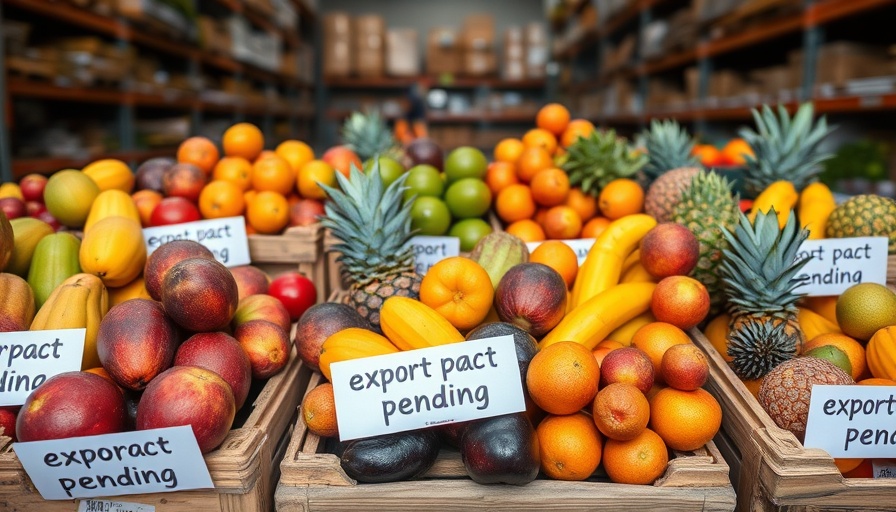
The Growing Promise of Vietnam's Agricultural Exports
Vietnam’s agricultural sector is experiencing unprecedented growth, with exports of fruits, vegetables, and seafood surging in 2025. This upswing is highlighted by burgeoning international demand for durians, dragon fruit, and other products. According to EBC Financial Group, Vietnam’s fruit and vegetable exports have reached over USD3.8 billion in the first seven months of the year alone, showcasing a prosperous path forward. Notably, durian exports accounted for an impressive USD3.3 billion last year, making Vietnam a formidable player in the global market.
Strategic Opportunities Amidst Regulatory Setbacks
Despite the thrilling growth story, traders are cautioned about emerging regulatory and logistical bottlenecks. Certification delays for time-sensitive products, such as dragon fruit, have proven detrimental, with large quantities going to waste due to ineffective processes. Just recently, GlobalGAP-certified dragon fruit faced enormous losses after spoiling during extended storage times, which brings to light the critical nature of streamlining required regulations to protect market opportunities.
Market Dynamics: Navigating the Landscape
While the global market is starting to open to Vietnamese food products, obstacles loom that could stifle this momentum. An essential observation is China's recent status as Vietnam's top shrimp buyer, surpassing the United States, which signifies a notable shift in trade dynamics. Analysts have pointed out that easing non-tariff barriers alongside effective logistics could further enhance Vietnam's export capabilities.
A Paradigm Shift in Consumer Preferences
The rise of veganism and plant-based diets across global markets presents an exciting avenue for Vietnamese fruit exporters. Coconuts, specifically, have seen a staggering price increase, reflecting this shift. Once relegated behind exports from Thailand and the Philippines, Vietnamese coconuts are now garnering significant attention, commanding USD7.26 per kilogram this year, which is a substantial increase from just USD1.21 two years ago. The burgeoning demand for natural and plant-based products is reshaping export strategies.
Addressing Hidden Challenges: Certification and Red Tape
Hidden challenges, specifically in certification, present a double-edged sword for traders navigating this vibrant export landscape. Quality assurance mechanisms are crucial but present logistical hurdles that involve red tape, which traders must prepare for. The need for efficiency in obtaining certifications without sacrificing quality can be pivotal to maintaining competitive pricing and timeline management in the market.
Future Predictions: Streamlining for Success
Looking ahead at the evolving trade environment, Vietnam’s continued emphasis on improving its regulatory framework is essential to supporting export stability. If successful, the country will not only capitalize on its current agricultural successes but will also establish itself as a leading exporter with sustainable practices, propelling its economy into an era of growth.
 Add Row
Add Row  Add
Add 




Write A Comment